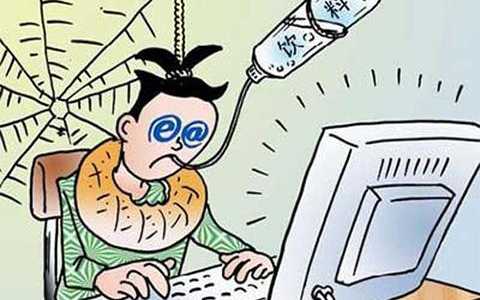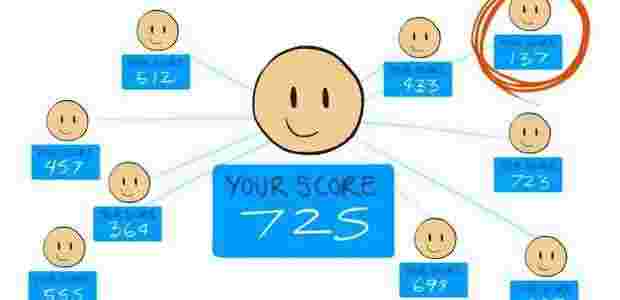Sesame Credit: The Dark Side of Gamification
Have you ever rifled through your purse or wallet at a cash register searching for your rewards card? Have you ever put a purchase on your credit card just so you could get those frequent flyer points? If so, you have experienced an example of Gamification.
What is Gamification?
Gamification is the process of adding gaming aspects to the real world. Concepts like points and achievements are given real world value and achieving those points within the rules of the game gives people real world rewards. Get enough points at a store? Get a discount. Achieve a new status or level in customer loyalty? Get in-store bonuses. It has been

An example of Gamification is the My Starbucks Rewards program. The program revolves around the Starbucks Card and an app that allows customers to pay for their beverage via their phone. As they use the app or their card to pay for their beverage they gain gold stars which, when accumulated, give customers bonuses and benefits that people who don’t use the program can’t get. Earning 5 stars gives the user “Green Level status”, which allows people to get free refills. The more stars collected, the greater the rewards given.
A system like this works because it benefits both the customer and the company. The customer gets rewards that scale with their connection to the company. In regards to the My Starbucks Rewards program, customers will eventually get greater rewards when they get more stars. This includes things like free food and drinks, early access to new products and custom offers only available to members with a high enough level. The customer is rewarded for their purchases with things that are tied to their interest in the company. If someone gets stars by buying drinks and food at Starbucks, these rewards are most likely going to be something they are interested in. At the same time Starbucks benefits from this as well. Customers are incentivized to return to Starbucks to get more stars and raise their level by buying Starbucks products. Also by giving different tiers of rewards for higher level Rewards members, customers are incentivized to buy more expensive things to get stars faster. Keeping customers loyal and incentivized to buy their products has given Starbucks increased revenue and a guaranteed customer base.
Sesame Credit: How it Started

The My Starbucks Rewards program is a mutually beneficial use of gamification, but what happens when gamification doesn’t work in everyone’s best interest? What happens if gamification is used to benefit the agenda of only one party and what happen if people can’t escape it? This is the potential future in China with the new social credit service Sesame Credit. Sesame Credit is a credit service started up by Alibaba, an internet company similar to Amazon. At the beginning of 2015, Alibaba teamed up with many Chinese internet companies, including social media giant Tencent and banking and insurance company Ping An Group. These companies created a consumer credit rating for both single consumers and small companies who may have very little or no credit rating in China. These companies want to continue to expand in the international marketplace but can’t do that when a large percentage of their userbase in China doesn’t have a credit rating. Rather than leave those customers behind to try and pursue the international market, Alibaba used the data that they and their partners had collected in order to establish a credit score for these people and small businesses. Alibaba collected information on the spending habits of over 300 million people and over 37 million small businesses to accurately assess the credit scores that people should have.
In this vein, Sesame Credit is very similar to any other credit services around the world, however there was one major difference. Sesame Credit doesn’t only take in credit information and spending habits, but also online behavioural patterns, personal characteristics (how long they have lived in a specific residence or their mobile phone information) and their personal relationships. It monitored who small companies were associated with and who people were friends with online through places like Tencent related social websites. With this information the scores of peoples’ Sesame Credit were affected by who they chose to interact with.
Some Dark Turns: How Sesame Credit has Changed

That was how Sesame Credit started, however, the Chinese government has monitored how it works and has begun modifying it to a fairly disturbing degree. The government of China is taking this information and using it to create a credit app very similar to the Sesame Credit scoring system. This app shows people their score, but it also has some sinister changes that have turn being loyal to the government into a game.
“The government wants to build a platform that leverages things like big data, mobile internet, and cloud computing to measure and evaluate different levels of people’s lives in order to create a gamified nudge for people to behave better.” stated Dr. Rogier Creemer, a University of Oxford researcher who studies Chinese law, media law and the policies of the Chinese government.
The Chinese government wants to use their new version of Sesame Credit to gamify loyalty and incentivize people to follow the party line with gamification style rewards.
Similar to the credit scoring of Sesame Credit, this new credit service monitors what people are buying and other shopping habits. It then evaluates whether those shopping decisions are positive or negative in the eyes of the regime. Purchasing things the government deems positive will give the buyer points, while purchases that the government deems negative lose people points. These points are given to people through the app and are updated regularly. People post their high scores on social media sites similar to how people posted their Flappy Bird scores on Twitter when that game came out and a meta-game has emerged from it of people trying to get the highest score out of their friends. As of right now the app is voluntary and free, however in 2020 it will become mandatory for people to have it and even now it is hard for people to completely avoid getting the app. On the surface this app may appear to be a bit odd and relatively harmless, however, there are some malevolent aspects to this gamification of nationalism that must be taken into account.
The Major Problems
For starters, it is the government that decides what gives points and what takes points away. In an interview conducted by the BBC’s Celia Hatton (a BBC correspondent based in China), Chinese citizens lamented about how the scoring system can be somewhat unfair. One person talked about how he liked to purchase video games, but that hurt his social credit score because the government deemed buying video games as something negative towards the regime. Similar negative penalties have been given out to imported goods like manga from Japan or anything from Hong Kong or Taiwan.
It isn’t just purchases that the government is monitoring either. Social media websites are being monitored as well, and actions taken on those sites can have a negative or positive effect on a person’s score. Post positive things about the Chinese government or the national sports team, and as a result they will get points. Post pictures of Tiananmen Square or talk about problems in the nation’s economy, and you will lose points. All this is decided by the Chinese government and by what they deem positive or negative, meaning that people can quickly become taught what to think. If a person imports products from Japan and loses points, there is an instinctive thought that will creep into their head. Even if the person is completely aware of why the Chinese government is giving them negative points and completely aware of all the implications of those negative points. That means that the purchase will be associated with negativity and that will have an effect on future purchasing decisions. People instinctively want to do the best they can and if a purchase is seen as negative, then the re-education has begun. People will be taught that purchasing these types of things is bad, and they will be taught through gameplay.
The second thing that makes this social credit incredibly unethical is the social connectivity of it. At any point anyone can look up another person’s score and compare it to their own. When someone adds friends they are shown their score alongside your other friend’s score. You can compare and contrast scores with anyone in the app, and when this app becomes mandatory in 2020 that means anyone can see anyone’s score at any time.
These aspects of the new Sesame Credit are already a fairly large breach of privacy; however they aren’t the worst thing about this social connectivity. The scores of people’s friends and associates on the app will affect their score. Having friends with low scores will lower their score, and when your friends have higher scores than you that means you are lowering their score. This heavily incentivizes isolation of people the government deems unsatisfactory, as people are encouraged to stay away from low scoring people.

By now many of you readers are wondering so what? So what if people have a low score? If they don’t have the highest social credit score it isn’t going to affect you any more than not having a high score in Bejewelled or Candy Crush right? Well that isn’t necessarily the case. This social credit score works similar to a credit score anywhere else. Right now the social credit system isn’t mandatory but it is heavily pushed on people. Not having a score or having a low score could negatively affect people’s chances of getting a loan or renting a place to live. Without proof that you are a loyal, financially responsible citizen many companies aren’t willing to take risks on people.
The most heinous aspect of this social media credit, however, is the rewards and detriments given out to people as a result of their score. Having higher scores gives people positive things like faster visas for international travel, bonus cash for hotel booking, easier time renting cars, and even special memberships to programs like dating sites. These benefits are given out at specific scores and can be monitored by anyone. For example, having a social credit score of 600 (scores range between 350 and 950) gives people a 100 yuan credit whenever booking hotel rooms.
The government of China is also preparing to institute punishments for having a low score. Details about these punishments haven’t been finalized, however some of the punishments that have been discussed including: inability to apply for certain jobs (mostly government jobs and political positions), restricted internet speeds, and restrictions on visa applications. If this goes through, having a low score could ruin people’s lives, their careers and their family.
How Gamification Could Ruin Lives
To demonstrate how this could destroy people’s lives we will have to go through some fictional but very plausible scenarios. The first is a small Chinese business that makes cellphone cases and accessories for iPhones. This business has had a lot of connections with Japan in the past because there are a lot of people in Japan buying their phone cases online. As a result of this they decide to start making a phone case with the Japanese flag on the back to sell to Japanese customers. The government decides that these new cases are celebrating Japanese national pride and the system lowers their score to such a degree that their internet speed is cut. Now they can’t sell their phone cases as effectively to Japanese customers. They will have a hard time selling in China because their low score has made getting a loan difficult, thus making it difficult for them to expand their physical stores. If this business doesn’t renounce their Japanese customers they will most likely fail and several people will lose their jobs.
A woman is a single mother of two children, ages 15 and 17. The 15 year old is someone that the government would deem a good citizen. He likes to watch table tennis and soccer and is active in his hobby. He posts excited statuses on social media when his favorite teams wins, he buys team jerseys and even bought a table tennis table to play with his friends. His purchases and his social media presence are both good in the eyes of the government. The 17 year old on the other hand, is somewhat rebellious. He doesn’t like some of the moves that the government has done and has even posted about it a couple of times online. He never buys pro-Chinese products and likes to read manga imported from Japan. The Chinese government would most likely not like these decisions and would give him a low score as a result. The mom is working at a government job and needs this job to provide for herself and her kids. She doesn’t really have a lot of disposable income or time to browse social media so her social credit score is waning. To keep her job she needs to boost her score up a bit, so what should she do? Should she put all her effort into nurturing her 15 year old’s interests in hopes that when he gets a high score it will be high enough to boost her score up? Or should she punish her 17 year old for not liking the government and not following their desires? Should she disassociate herself from him in order to make sure that his low score doesn’t get her fired and unable to provide for all three of them?
Five friends in their early 20’s decide to get the app early and play a game of who can have the highest score. It starts out as good fun but their interests differ and it becomes clear that one of them will keep having a much lower score than the others. The four other friends all want a higher score, but don’t really want it bad enough to abandon their friend, or at least that would be the case if these rewards didn’t exist. One friend wants to travel the world while another likes playing League of Legends and Hearthstone (both online games) and the other two get jobs that require lots of travel from China to Japan and Korea. Being associated with their one friend who has a lower score means it will be difficult to get the visas and the internet speeds they want so what should they do? Should they shut him out of their lives or should they group up and force him to start sucking up to the government by buying things he doesn’t want or saying things online that he doesn’t believe in just to help his friends.
A big thing that many people like about games is the sense of accomplishment given out by completing a task. The feeling of fulfillment that comes from finishing a hard raid, winning a death match or even just leveling up some equipment gives people a drive to keep playing games even when the game drags onwards. Bringing that feeling into the real world has the potential to do a lot of good for education, communities and science. Examples of this have happen before many times, however all the potential it has to do good can be flipped to do harm. Punishing disobedience, monitoring citizens, re-educating people and isolating undesirables; all this happened because of the introduction of gamification. By adding points and level based rewards the Chinese government has made a system where they control people without having to fight against rebellions or shut down demonstrations. This is a powerful tool that many companies use to get customers into their store, but it also can be used to spread idealisms at the expense of the players. It is important to know when gamification is being used in our lives because understanding when gamification is being used people can tell when they are playing a game, and when they are being played.
Works Cited
BBC News Report by Celia Hatton: http://www.bbc.com/news/world-asia-china-34592186
Report from CounterCurrentNews which includes Rogier Creemers Quote: http://countercurrentnews.com/2015/12/china-obedience-game/#
Video by Extra Credits: https://www.youtube.com/watch?v=lHcTKWiZ8sI
FT Report on original Sesame Credit: http://www.ft.com/cms/s/0/34e77fe8-a6a3-11e4-9bd3-00144feab7de.html#axzz3wQvTKLd4
Caixin Online Report of Alibaba’s Sesame Credit: http://english.caixin.com/2015-09-28/100859064.html
The Independent Report on Sesame Credit: http://www.independent.co.uk/news/world/asia/china-has-made-obedience-to-the-state-a-game-a6783841.html
Quartz Report with some First Hand Use: http://qz.com/519737/all-chinese-citizens-now-have-a-score-based-on-how-well-we-live-and-mine-sucks/
What do you think? Leave a comment.











You know, in a way, this Sesame Credit scoring system reminds me of the American educational system I grew up with. For that reason, I have to wonder if, assuming the system does go into effect in 2020, people will start looking at their lower loyalty scores and thinking that’s what they deserve.
That’s what is potentially so dangerous about this system. If there is mathematical proof (like a score) that shows you are not a good citizen, then it is possible for people to believe it.
Psycho-pass …sybil system’s baby..
It’s a game, therefor… cheat.
How
By forcing citizens to fall in line in any way will in the end only separate the general mixed public(both good and bad, little to no extreme examples) into concentrated ”good” group and highly explosive ”evil” group, which will very likely see those things as a violation of their rights and probably will start a rebellion(first attempts peaceful, later violent)
It will basically cause the low level people to group up, reinforce their feeling of being stepped upon just by seeing their numbers rise.
The same system, but less transparent to the people, is implemented in UK and US for over a decade.
What you label “peer pressure” can in fact be positive thing as people can see what is running down their score and change the policy e.g. for Japanese Manga to have positive score. In US, you don’t have that chance.
Its the fact that having a poor score has negative repercussions that really worries me about the Credit system. If there was no punishment for having a bad score then it would be ok but forcing people to follow the whim of the government or suffer the consequences is troubling to say the least.
In the US and the UK there is an overarching social norm but breaking that social norm isn’t bad. With how easy it has become to socialize anyone can find other people who share their personal interests, no matter how outside of the social norm it lies.
Also the people in charge of the scoring system didn’t accidentally make buying Manga from Japan negative, they did it on purpose to try and discourage imports (something that costs the nation) and also discourage leisure activities (something that stops people from contributing to society). They won’t change the score to be positive because that would completely undermine what they are trying to do.
1984 here we come!
So China had created a Psycho Pass System? I wonder how long it would take to reach to the U. S. conservatives would love this.
Frankly, this is a good thing. It would help people become more “good”. If your score is low, then you strive to make it higher. It gives people a reason to help their country.
I don’t mean to sound like one of those anarchist morons, but what’s best for the country doesn’t necessarily always fall in line with what the government wants. This system serves to encourage people to agree with everything the government says and does, and it’s essentially censorship of radical ideas.
I agree with you to an extent, however the problems that I found with the way Sesame Credit is doing things is that 1. The government is deciding for people what is good and what isn’t good and 2. there are negative consequences to having a bad credit score.
This is something out of cyberpunk fiction.
Hopefully when this starts causing problems people will see the biggest flaw in meritocracies: such a system will always be biased by the people who make it.
When such a game is created. A hacker must rise up to create chaos and anarchy. When admins all over the servers try to ban them forever. Hackers must always find a way.
So, is it ethical to do this kind of gamification to promote things widely considered good and to condemn bad practices?
We kind of do that already in our society. Demerit points on your drivers license (in Canada and some parts of the US) are negative points for breaking driving laws. The ethical debate really hinges on personal taste for people as long as it doesn’t violate international law but I personally believe that the gamification of these types of things is perfectly ethical as long as losing or doing poorly doesn’t have negative side effects on your life outside of the game process.
Brave new world.
It’s always easier to recognize this kind of thing when it is happening to other people outside of your normal everyday life.
This. What’s scary is how we don’t see it in our own lives. All of those terrible things are happening here too just in a lower key and less unified way.
Whilt the sesame credit system may promote staying in line, it may also promote rebellion at the same time. There may be large circles in which to join you have to have a really low score, and that actively promote not staying in line.
Thank you for the article; this is a serious human rights problem among many in China’s new five year plan. It was well researched and explained with exact language.
Thank God I don’t live in China. It is a fascist paradise.
More people will do drugs because of this sesame street.
I don’t think this system would EVER work outside China. China is a country where education and “following the line” starts at a very young age, and people who get out of line are already on the minority. What would happen if this came to America, Portugal, Spain, UK?
Oof, I’ve heard about this. Pretty sure it’s propaganda.
Many aspects of gamification are being heavily marketed into post-secondary education now by pretty well all of the major online learning management system players. Points, badges, certificates all are available to award and thereby reward every minute activity by the consumer student, who is supposed to be doing their work anyway…
I lived in China for a few years and I think this system would be difficult to enforce at first. Many people I worked with avoided most forms of social media and the ones that didn’t were more interested in photo sharing and shopping. Most if not all understood the limitations of their ability to surf the internet and found ways to get around it.
But at the same time it wouldn’t be ridiculous to see this in practice, and to see it held up by the people who use it. My coworkers and friends were often required to get a social messaging app in order to stay in touch with their clients at all times. If you were a teacher for example, that meant twenty to thirty students and their parents. Wouldn’t be that odd for them to check and demand that their workers use an app like that too.
This was bleak (well written and accurate, but depressing nonetheless). I tended to imagine that if my life were more like a video game, I would be the protagonist, not the canon-fodder used and abused like cogs in the system. Just another dream shattered by a harmless article on the internet.